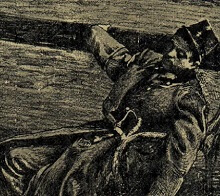These days, exactly on 21 October, the 90th anniversary of the death of the doctor, storyteller and playwright Arthur Schnitzler was commemorated. Like Thomas Bernhard in the 20th century, Arthur Schnitzler at the turn of the century 18/19 was considered a provocateur per exzellente for the “upper society” and militaria at that time. Both authors did not shy away from rubbing salt into the unhealed wounds and exposing grievances in society.
His play “Der Reigen” still offers room for scandal today. However, when the text of the novella “Leutnant Gustl” appeared in the Christmas supplement of the “Wiener Neue Freie Presse” in 1900, in which he attacked the military code of honour, he was stripped of his officer’s rank as senior physician in the reserves on 14 June 1901.

There is also a separate composition about this piece with the same title. The composer Robert Brunnlechner writes in it: “Gustl, a lieutenant in the Imperial and Royal Army. Army, is dreadfully bored at the performance of an oratorio for which he has been given a ticket, and begins to indulge in thoughts of his own: He longs for war glory, looks forward to a duel that is to take place the next day. After the concert, in the crowd at the cloakroom, he gets into an argument with a master baker who insults him and threatens to break his sabre. In accordance with the military code of honour, Gustl finds himself in a dilemma: as his adversary, a simple craftsman, is not capable of satisfaction, he cannot challenge him to a duel. Completely dismayed, he wanders around the city at night and ends up in the Prater, where he comes to the conclusion that he must shoot himself. When he arrives at his favourite café in the morning, he learns from the waiter that the aforementioned master baker has died unexpectedly during the night. Since he can no longer tell anyone about the embarrassing incident, Gustl sees himself saved and sets off for the arranged duel.
This novella by Arthur Schnitzler sparked a veritable scandal in 1900, as the author had dared to satirise outdated notions of honour and class in the hitherto untouchable army in such a drastic way, but it also established his literary world fame.”
After Christian Löw, trumpeter with the Vienna Symphony Orchestra, had encouraged the composer some time ago to write a solo work for him, and the latter, on the other hand, had been toying for some time with the idea of musically treating the subject of Lieutenant Gustl, which is particularly appealing for wind music, this hybrid of a programmatic tone poem and an instrumental concerto emerged from the combination of the two ideas, with the character of Gustl being portrayed in a virtuoso and humorous manner by the solo trumpet.
Stylistically, the work is an obvious link to the Austrian military music tradition, with motivic references to two key works of the early 20th century that also deal with military themes: Stravinsky’s Story of the Soldier and Berg’s Wozzeck.
Arthur Schnitzler was born on 15 May 1862, and would celebrate his 160th birthday next year. A nice occasion to commemorate the poet with the solo piece for trumpet “Leutnant Gustl“. The sheet music is only available as a download directly from the publisher.






